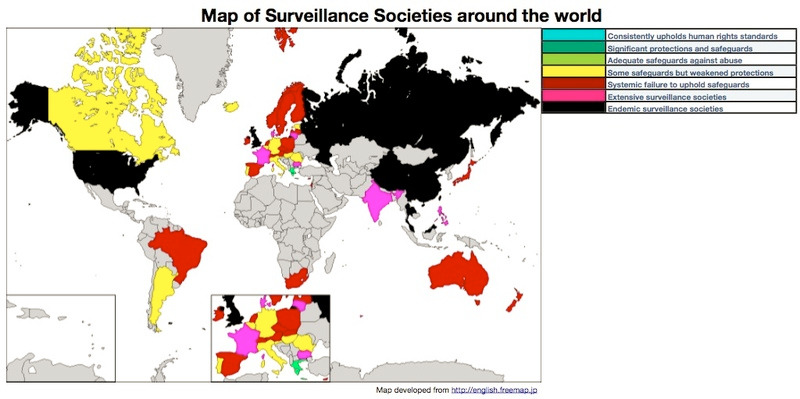Who's Afraid in the Surveillance State?
According to the US Justice department passing information to an alien power, the public, is worse than espionage
Those learning to love the surveillance state can often be heard to ask: "If you've nothing to hide what are you worried about?" If we just turn that around we get a much more interesting question: what kind of state wants to know everything there is to know about its citizens? And what does it have to hide?
Governments claim their main concern is about security and terrorism. So we get a debate about "balancing" privacy and security as if terrorism were something that festers in primitive societies without any apparent cause, except the inherent evil that's just out there. And we just have to spy out the malevolent forces lined up against us. Sacrifice a bit of privacy and we're protected from them.
Robert Gates, 15th Director of the CIA and Defense Secretary under both Bush II and Obama, hardly known as a left wing radical, wrote in 1998 that the continuation of an aggressive US foreign policy would lead to an increase in terrorism and exact a heavy price in "blood and treasure". (One imagines he wasn't referring to his own). This was a pretty standard analysis by a Washington insider of the likely price of US actions. What was unusual was that it appeared in an article in the New York Times for all to read. Confirming Gates' predictions, a study on global terrorism published in 2007 showed a sevenfold increase after the invasion of Iraq. This in turn confirmed the administration's own assessment of April 2006 that "the Iraq War has become a 'cause celebre' for jihadists...and is shaping a new generation of terrorist leaders and operatives."
The information is out there and US administrations know exactly what's going on, but there's very little public debate about it. Hundreds of thousands of dead people. The destruction of Iraqi civil society and its culture. All of no consequence. As far as most western media, public intellectuals and public statements by governments are concerned neither are there any consequences. Terrorism just fell from the sky.
Governments are clearly more interested in distracting attention from substantive issues than they are in getting real about protecting their citizens from terror attacks. The reactions to wars of aggression or to longstanding support for dictators in the middle east and elsewhere are predictable, as are the results of decades of supporting or deliberately creating militias and terrorist groups to pursue short term ambitions. We're supposed to let ourselves be spied upon to an unprecedented extent in order to 'prevent' terrorism principally caused by extremist policies that remain effectively unchanged and the real driving forces behind them undiscussed. Under the resulting real threat, the need for mass surveillance to 'protect' us can be hyped up, together with further militarization leading to a further increased threat.
We are told that in the west that we live under systems of representative government. That would imply a reasonable level of trust between citizens and state. Yet it's clear that the US and the UK, at least, don't trust their citizens. Both were classified as 'endemic surveillance societies' by the London based Privacy International in its last international table. (It's interesting that the last international table appeared in 2007, the year the US made it to the endemic surveillance state category). The public have become the target of intelligence, the state's first line of defence. It's difficult to imagine how such states can still be thought of as representing people they see as their enemy. But propaganda works. Years of bombardment with the threat of terror, paranoia about Muslims or asylum seekers, have softened us up. Can it be that 'Brave New World' and '1984', visions of a totalitarian nightmare, are now just something to shrug our shoulders about and say "I've got nothing to hide"?
Conversely, states that are obsessed by surveillance are themselves highly secretive. The current US administration is paranoid and vindictive about those who expose its own secrets. Obama has gone after whistleblowers like no president before him. Chelsea Manning, serving a 35 year sentence, was subjected to ill treatment amounting to torture in prison, and outside her penal institute to character assassination in the media and by government figures. A New York Times journalist, James Risen, is currently trying to protect his sources from an all-pervading state pissed off about being exposed. His alleged source, Jeffrey Sterling, who is reported to have blown the whistle on manipulation and disinformation around Iran's nuclear programme that he feared (rightly) could have led to another war, faces the possibilty of decades in prison.*
A whistleblower like Sterling stands alone against a malicious state without even the limited protection that Risen has as a well-known journalist. A 6th June 2011 motion by the Justice Department to have Sterling detained argued "The defendant's unauthorized disclosures.....may be viewed as more pernicious than the typical espionage case where a spy sells classified information for money." According to Obama's Justice Department then, passing information to an alien power, the public, is worse than being a spy, for whom in Dante's Inferno (Sinon, Achaean spy) and in nations the lowest circle of hell is already reserved.
There have been open calls for the murder of Edward Snowden, and of Julian Assange:
Snowden's revelations exposed Director of Natonal Intelligence James Clapper as having lied to Congress about NSA spying on "millions or hundreds of millions of Americans". To be sure, lying to Congress carries a maximum penalty of eight years, but Clapper is more likely to spend the next eight years attending establishment cocktail parties. Clapper has instituted controls over the sharing of non-classified information with journalists. Obama's little discussed "Insider Threat" programme requires government employees, under threat of punishment, to spy on each other and report non-conformist behaviour. McClatcheys news agency reported (20th June 2013) that a June 1st 2013 Defense Department strategy states "Hammer this fact home.....leaking is tantamount to aiding the enemies of the United States".
To come back to the question: what does a state obsessed by surveillance that is itself obsessively secretive have to hide? There are plenty of examples. An obvious one is the manufacturing of consent for the invasion of Iraq. The massive deception of the public by government and media filtered out during and after the event, though the 'toppling a dictator' version is still hawked around and has plenty of true believers. A barrage of propaganda reduced public awareness until it was too late to prevent hundreds of thousands of deaths, and the devastation that became the perfect background for the rise of groups like ISIL.
The furore around Iran's nuclear programme raises a dust around another. An unclassified report by the US Department of Defense states "Iran's military doctrine is defensive. It is designed to deter an attack, survive an initial strike, retaliate against an aggressor, and force a diplomatic solution to hostilities while avoiding any concessions that challenge its core interests." (DD, Jan 1st 2014). Mohammed ElBaradei , then head of the IAEA, said in 2007 he was "worried about the growing rhetoric from the US" focussing on "Iran's alleged intentions to build a nuclear weapon rather than evidence the country was actively doing so." (Herald Tribune, Oct 2007). (Elbaradei has since been replaced by a more pliable functionary). Information is out there and can be found if you search hard for it, yet there's still a consensus around the 'threat' from Iran and from its nuclear programme. The public has been bombarded with propaganda about Iran while the real issues around political and economic hegemony in the middle east are kept under the table.
This is grand scale deception and manipulation of the public to the extent that we have virtually no say in foreign policy.
The impulse to seek complete control arises out of an underlying sense of weakness and fear. HAL, the all-powerful and almost human computer in Stanley Kubrick's '2001' confessed in the end that he was afraid. He was facing defeat by an individual he hadn't trusted to complete the overriding mission. States - corporate states - believe they know what that overriding mission is. Mere citizens don't. That's neither surprising nor new. Walter Lippmann wrote in 1922 that "the public must be put in its place....so that each of us may live free of the trampling and the roar of a bewildered herd." He expressed the thought perfectly with the fine arrogance of those who think they know what's good for humanity. But behind that arrogance and the current festering obsession with control is a growing fear. Wikileaks, Snowden - the genie is out of the bottle. The threats, the vindictive lawmaking, might slow it down but they won't get it back in. We've all now had a glimpse of the "deep state". There will be more whistleblowers. An even scarier thought for the power elite: the "bewildered herd", having glimpsed something of the undeclared war against them, might just begin to decide for themselves what mission they're on.
* On 12 May 2015 Jeffrey Stirling was sentenced to three and a half years, an unexpectedly short sentence well below guidelines of 19 to 24 years. "The guidelines are too high" said US district judge Leonie Brinkema.





